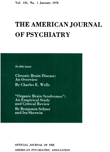Religiousness, conversion, and subjective well-being: the "healthy- minded" religion of modern American women
Abstract
Data from a survey of 2,500 American women were examined to determine 1) the nature of religiousness among women and, in particular, whether modern religiousness corresponds to William James' conception of "healthy-minded" religion; 2) how religiousness is related to self- reports of mental and physical health; and 3) differences between converts (mainly to Protestant denominations) and women who have maintained the same religious affiliation all their lives. The authors found that healthy-mindedness described the nonconverts (the majority) fairly well, and that certainty of beliefs (either strong religiousness or confident nonreligiousness) was associated with better mental and physical health. Converts were distinguished from nonconverts by the former's relatively happy and less religious childhoods, stronger adult religiousness, and greater authoritarian tendencies.
Access content
To read the fulltext, please use one of the options below to sign in or purchase access.- Personal login
- Institutional Login
- Sign in via OpenAthens
- Register for access
-
Please login/register if you wish to pair your device and check access availability.
Not a subscriber?
PsychiatryOnline subscription options offer access to the DSM-5 library, books, journals, CME, and patient resources. This all-in-one virtual library provides psychiatrists and mental health professionals with key resources for diagnosis, treatment, research, and professional development.
Need more help? PsychiatryOnline Customer Service may be reached by emailing [email protected] or by calling 800-368-5777 (in the U.S.) or 703-907-7322 (outside the U.S.).



